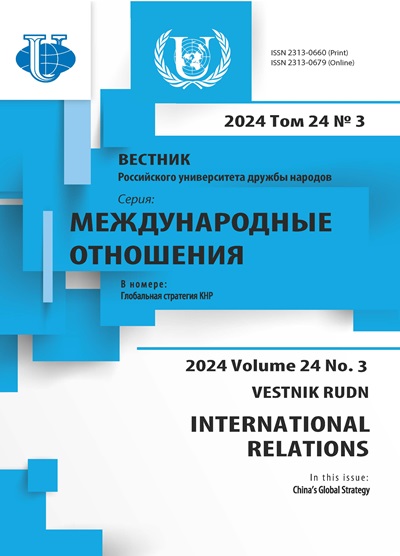Роль ООН в разрешении международных конфликтов
- Авторы: Сулейманов А.В.1
-
Учреждения:
- Нижегородский институт управления РАНХИГС
- Выпуск: Том 17, № 1 (2017): Международные организации и незападный мир
- Страницы: 86-94
- Раздел: МИР И БЕЗОПАСНОСТЬ
- URL: https://journals.rudn.ru/international-relations/article/view/15879
- DOI: https://doi.org/10.22363/2313-0660-2017-17-1-86-94
Цитировать
Полный текст
Аннотация
В последние годы наблюдается обострение перманентных конфликтов, а также усиливается рост конфронтации государств на международной арене, что безусловно вновь актуализирует вопрос о роли ООН в области разрешения международных кризисов. В этой связи целью статьи является определение степени влияния ООН на процесс урегулирования международных конфликтов на современном этапе. Автором делается краткий анализ посреднической деятельности ООН, определяется ее правовая база. Кроме того, рассматривается специфика функционирования Международного суда ООН и разрешенные им территориальные споры за прошедшие годы. Основным методом исследования является сравнительно-исторический подход, использующийся для выявления динамики функционирования ООН на современном этапе. В настоящее время ООН активизирует усилия в решении ряда международных кризисов, а также пытается снизить их эскалацию. Однако до настоящего момента наиболее серьезные международные конфликты остаются неразрешенными, что может быть доказательством недостаточной эффективности организации в решении данных вопросов.
Об авторах
Алим Видадиевич Сулейманов
Нижегородский институт управления РАНХИГС
Автор, ответственный за переписку.
Email: alim-suleymanov@mail.ru
Нижний Новгород, Россия
Список литературы
- Крупянко И.М. Эволюция миротворческой деятельности ООН после холодной войны: на примере операции по поддержанию мира в Камбодже и на Восточном Тиморе / И.М. Крупянко. М.: Восточная литература; 2006
- Федоров В.Н. Организация Объединенных Наций, другие международные организации и их роль в ХХI веке. М., 2007
- Bauwens W., Reychler L. The art of conflict prevention. London, New York; 1994
- Bercovitch J. Third Parties and the Management of Conflict: The United Nations and the Mediation of International Disputes. Conference on 'The U.N. at 50' at the University of Otago 30th Foreign Policy School, 30 June - 3 July 1995
- Hampson F.O. Can the UN Still Mediate? 2003. URL: http://www.operationspaix.net/DATA/ DOCUMENT/5871~v~Can_the_UN_Still_Mediate_.pdf (accessed 15.01.2017)
- Hampson F.O. The role of the United Nations in conflict resolution and peacekeeping. 1990. URL: http://www.e-cultura.sapo.pt/ieei_pdf/81/Fen_Osler_Hampson_The_Role_of_the_United_Nations (accessed 15.01.2017)
- Latif D. United Nations changing role in the post-Cold War era. URL: http://dergiler.ankara.edu.tr/ dergiler/44/670/8528.pdf (accessed 15.01.2017)
- Luck E. Reforming the United Nations: Lessons from a History in Progress // International Relations Studies and the United Nations Occasional Papers. 2003. N 1
- Mollel A. International adjudication and resolution of armed conflicts in the Africa’s great lakes: A focus on the DRC conflict // Journal of Law and Conflict Resolution. 2009. Vol. 1 (1). P. 10-29
- Racic O. The United Nations between the pacific settlement of disputes and imposition of peace // Law and Politics. 2000. Vol. 1. N 4. P. 493-508
- Ratner S. Image and Reality in the UN's Peaceful Settlement of Disputes. URL: http://www.ejil.org/ pdfs/6/1/1305.pdf (accessed 15.01.2017)
- Vayrynen R. Focus On: Is There a Role for the United Nations in Conflict Resolution? // Journal of Peace Research. 1985. Vol. 22. № 3. P. 189-196











